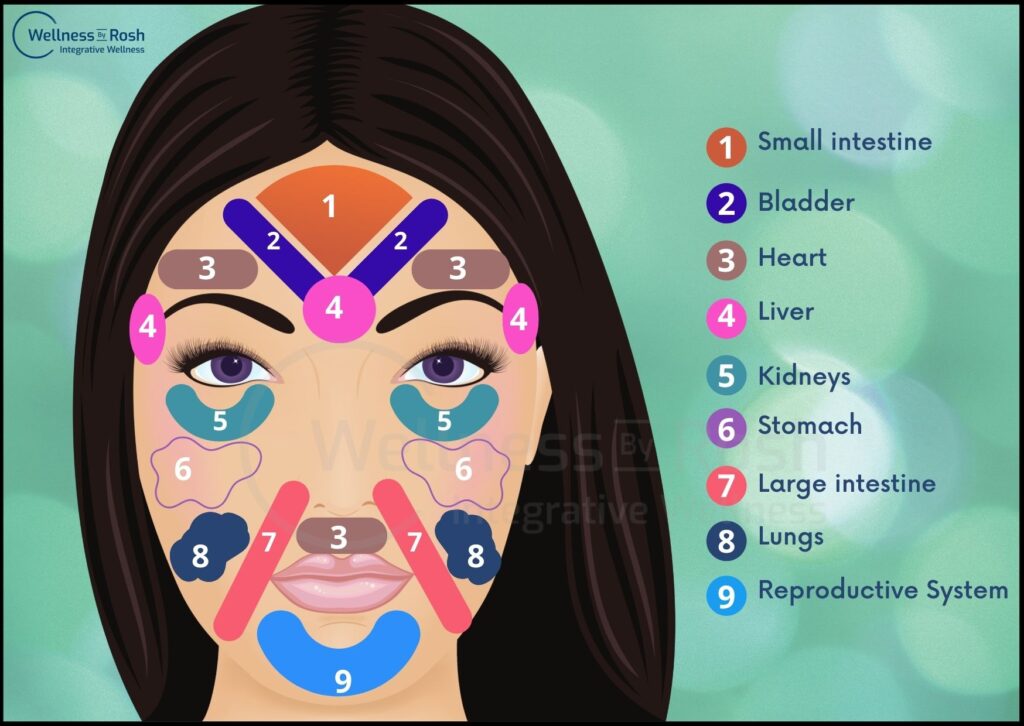
Your skin is more than just a protective barrier—it is a dynamic mirror reflecting your internal health. From hormonal imbalances to digestive issues, the appearance of your face can reveal vital information about your overall well-being. This comprehensive guide explores the science of face mapping, common skin signals, lifestyle impacts, real-life case studies, and actionable advice for achieving healthy skin while addressing underlying health concerns.
Why Your Skin Reflects Your Health
Often regarded as the body’s largest organ, the skin not only protects internal organs but also serves as a visible communicator of your health. Changes in your skin—whether it’s dryness, breakouts, redness, or dullness—can signal nutritional deficiencies, hormonal fluctuations, stress, or underlying medical conditions. Understanding these signs empowers you to proactively manage your health and prevent minor issues from becoming serious problems.
Key Takeaways:
- Skin is a reflection of internal health.
- Observing changes can reveal hormonal, digestive, or systemic issues.
- A holistic approach combining lifestyle, diet, and skincare enhances well-being.
What Does Your Face Skin Say About Your Health?
Your face is often the first place where internal health changes appear. Facial skin reacts more quickly to imbalances due to its thin, sensitive, and highly vascular nature.
Signs to Watch For:
- Forehead Breakouts: Often indicate stress or digestive issues. High-stress periods or poor diet choices may trigger acne here.
- Cheek Acne or Redness: Could suggest respiratory issues, allergies, or sinus problems. Environmental irritants or smoking may also worsen cheek inflammation.
- Jawline and Chin Acne: Frequently linked to hormonal imbalances, particularly in women during menstrual cycles.
- Dark Circles or Puffy Eyes: Might signal sleep deprivation, dehydration, or vitamin deficiencies.
Practical Tips:
- Keep a daily skin journal tracking changes, sleep, diet, and stress levels.
- Consult a healthcare provider for persistent or unexplained skin changes.
- Adjust lifestyle factors like hydration, diet, and sleep to support skin health.
Is the Skin the Mirror of Health?
Yes—skin often acts as a diagnostic mirror for your body’s internal functions. Conditions like eczema, rosacea, chronic dryness, or unusual pigmentation can indicate systemic imbalances. Your skin may provide early warning signs for issues such as gut dysbiosis, thyroid dysfunction, hormonal imbalances, or nutrient deficiencies.
Real-Life Example:
A patient with persistent rosacea discovered that gut inflammation was exacerbating her skin condition. By adjusting her diet and introducing probiotics, her redness significantly decreased, illustrating how skin reflects internal health changes.

Is the Skin on Your Face the Same as Your Body?
While facial skin shares many properties with body skin, it is thinner, more sensitive, and more exposed to environmental factors like UV radiation, pollution, and temperature changes. These factors make facial skin more reactive and likely to show early signs of internal issues.
Differences:
- Facial Skin: Thin, delicate, reactive, more prone to breakouts and redness.
- Body Skin: Thicker, less sensitive, can reflect chronic systemic issues such as eczema or psoriasis.
Actionable Advice:
- Use lightweight moisturizers and SPF on the face.
- Hydrate and maintain a balanced diet for both facial and body skin.
- Monitor facial skin regularly as it can indicate early health issues.
Face Mapping: An Ancient Tool for Modern Health Insight
Face mapping, rooted in traditional Chinese medicine (TCM), links specific facial areas to corresponding organs and body systems. By observing where skin issues occur, practitioners aim to identify potential internal imbalances.
Key Zones:
- Forehead: Linked to digestive system and liver. Stress, poor diet, or dehydration may cause breakouts here.
- Cheeks: Associated with lungs and respiratory system. Sinus infections, allergies, or smoking may contribute to redness or breakouts.
- Nose: Connected to cardiovascular health. Persistent redness may indicate blood pressure issues.
- Chin and Jawline: Hormonal health indicators. Breakouts here may be linked to menstruation or hormonal fluctuations.
Practical Tip:
Face mapping should complement, not replace, professional medical advice. Use it as a guide to lifestyle adjustments, diet changes, and consultation with healthcare providers when necessary.
Common Skin Conditions and What They Reveal
1. Acne
Acne is more than a cosmetic issue—it can reveal internal health concerns:
- Forehead Acne: Stress, poor digestion, high sugar intake.
- Cheek Acne: Respiratory issues, allergies, environmental irritants.
- Jawline/Chin Acne: Hormonal fluctuations, especially during menstrual cycles.
Example:
A 28-year-old woman experienced jawline acne that intensified pre-menstruation. Hormone testing confirmed fluctuations, and lifestyle changes along with dermatological treatment significantly improved her skin.
2. Dry or Flaky Skin
Persistent dryness may indicate:
- Thyroid dysfunction (hypothyroidism)
- Vitamin deficiencies (A, D, or E)
- Dehydration
Tip: Maintain a nutrient-rich diet, use gentle moisturizers, and ensure adequate hydration.
3. Redness and Rosacea
Rosacea can stem from:
- Gut dysbiosis
- Dietary triggers like dairy or gluten
- Environmental irritants or sun exposure
Advice: Keep a food diary, manage stress, and consult a dermatologist for persistent rosacea.
4. Dark Circles
Causes may include:
- Sleep deprivation
- Dehydration
- Iron or vitamin deficiencies
Tip: Improve sleep quality, hydrate adequately, and consume iron-rich foods.
Diet, Lifestyle, and Skin Health
Diet
- High Sugar: Triggers inflammation and acne.
- Processed Foods: Can exacerbate skin issues.
- Nutrient Deficiency: Vitamins A, C, E, zinc, and omega-3 fatty acids are essential for skin repair and elasticity.
Lifestyle
- Stress: Elevates cortisol, worsening acne and eczema.
- Sleep: 7–9 hours is ideal for skin regeneration.
- Hydration: Vital for maintaining skin moisture and elasticity.
Example:
A 35-year-old man with persistent forehead acne improved after reducing processed foods and managing stress through meditation and yoga.
Real-Life Case Studies
Case Study 1: Hormonal Imbalance and Jawline Acne
- Problem: Persistent jawline acne in a 28-year-old woman
- Diagnosis: Hormonal fluctuations
- Solution: Lifestyle changes, skincare routine, and consultation with a dermatologist
- Result: Clearer skin and fewer acne flare-ups
Case Study 2: Digestive Issues and Forehead Acne
- Problem: Frequent forehead acne in a 35-year-old man
- Diagnosis: Poor digestion, stress-related flare-ups
- Solution: Dietary adjustments, stress management techniques
- Result: Noticeably clearer skin within weeks
Preventive Measures for Healthy Skin
- Balanced Diet: Fruits, vegetables, whole grains, and lean proteins.
- Skincare Routine: Cleanse, moisturize, and apply sunscreen daily.
- Stress Management: Meditation, yoga, or breathing exercises.
- Adequate Sleep: 7–9 hours nightly for cellular repair.
- Hydration: Drink 2–3 liters of water daily.
- Limit Alcohol and Tobacco: Both can negatively impact skin health.

When to Seek Professional Help
- Persistent or severe acne or rashes
- Sudden changes in skin color or texture
- Signs of infection, scarring, or allergic reactions
- Dermatologist or healthcare provider consultation is recommended
Frequently Asked Questions (FAQs)
Q1: Can face mapping replace medical diagnosis?
No. Face mapping is a complementary tool and should not replace professional medical evaluation.
Q2: Are there specific foods that improve skin health?
Yes. Foods rich in antioxidants, vitamins, and omega-3s promote healthy skin. Examples: berries, leafy greens, salmon, and nuts.
Q3: How can I determine if my skin issues are hormonal?
Track your skin in relation to menstrual cycles. Blood tests can confirm hormonal imbalances.
Q4: Is stress management effective for improving skin health?
Yes. Lowering cortisol levels reduces inflammation and improves conditions like acne and eczema.
Q5: How can I tell if my skin issues are diet-related?
Maintain a food and skin diary to spot correlations. Eliminate suspected triggers and observe improvements.
Q6: Are there natural remedies for common skin conditions?
Aloe vera, chamomile, and tea tree oil can help, but consult a dermatologist before regular use.
Q7: Can dehydration affect my skin’s appearance?
Absolutely. Lack of hydration leads to dry, dull, and less resilient skin.
Q8: How does sleep impact skin health?
During sleep, the body repairs and regenerates skin. Chronic sleep deprivation accelerates aging and dullness.
Q9: Are there skincare ingredients I should avoid?
Sensitive skin types should avoid parabens, sulfates, and artificial fragrances.
Q10: When should I consult a dermatologist?
For persistent, painful, or severe skin issues or signs of infection or scarring.
Final Thoughts
Your skin truly is a mirror of your overall health. By paying close attention to changes in your facial skin—whether it’s breakouts, redness, dryness, or dark circles—you can gain early insights into underlying health issues. While skincare routines and topical treatments are important, true skin health starts from within: nutrition, hydration, stress management, sleep, and lifestyle choices all play a critical role.